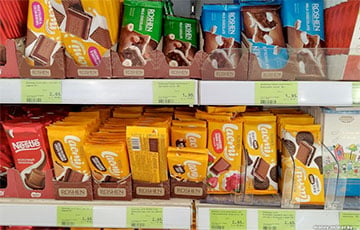Without Mivina and Roshen
14- 10.05.2022, 8:04
- 20,738

What is happening on the shelves of Belarusian shops?
Ukrainian goods are still on the shelves of domestic shops. However, the situation may change soon. Stocks are getting smaller and smaller, and new supplies from Ukraine are unlikely to come anytime soon, writes Belarusians and Market.
According to Belstat, the structure of the Belarusian commodity import from Ukraine includes a wide range of agricultural and food products: from soybeans and potatoes to juices and confectionery.
Belarusian consumers are well acquainted with the products of Ukrainian brands. Chumak and Torchin ketchups, Mivina noodles and seasonings, Sadochok juice, Roshen candies and other brands have always been in demand among Belarusians.
Last year, Ukraine's share in the import of certain items of agricultural and food products was significant - 20-30%, and sometimes it even exceeded 50%.
Until recently, Ukrainian products used to be sold all over the world and were naturally included in the shopping carts of Belarusians. It is difficult to predict what will happen in conditions of new reality, but it is likely that familiar brands can disappear from the shelves.
Wide assortment
Key imports from Ukraine in 2021 were agricultural products and processed foods. According to the State Statistics Service of Ukraine, the commodity item "remains and residues of the food industry" cost Belarus $189,564.3 thousand.
First of all, it refers to vegetable oilcake - a product obtained after the pressing of vegetable oil from oilseeds. It is widely used as a component of feed mixtures for animals and poultry.
Oleg Davydenko, a corresponding member of the National Academy of Sciences of Belarus, Doctor of Biological Sciences, spoke about the importance of this product for Belarus back in 2018: "Soybean oilcake is used to feed livestock. If we have soybean, we can compete in the market with our livestock products, because we provide ourselves with fodder. This is the country's food security. If suddenly we are denied American or Ukrainian soya, all the poultry farms will stop: without that feed a broiler will not grow to two or two and a half kilograms in 40 days".
Last year, Belarus bought 422,800 tons of soybean oilcake, including 186,200 tons in Ukraine. The southern neighbour of Belarus became a leader in supplies of sunflower oilcake, leaving behind Russia and Kazakhstan: 249.2 thousand tons of 479.6 thousand was bought in Ukraine.
Seeds and oilseeds are another major domestic import from Ukraine (according to Ukrstat, 150535.2 thousand dollars). Our country is most dependent on supplies of Ukrainian soybeans and rapeseeds. In 2021, Belarus bought in Ukraine 196.6 tons of soybeans and 49518 tons of rapeseeds.
In addition, potatoes (43% of total imports in 2021), beets and carrots (56%), cabbage (27%), and corn (17%) are actively imported from Ukraine.
Ukraine's share in imports of beef, as well as poultry and poultry by-products was significant. For example, out of 5960 tonnes of frozen beef imported into our country last year, 3455 tonnes came from Ukraine.
The range of Ukrainian food products is very large and includes hundreds of different items: canned vegetables, ketchups and sauces, fruit, sunflower oil, salt, confectionery and flour products, beer, juices, spices and other products.
Where to look for a replacement?
Some imported products can be replaced by domestic enterprises. For food products, this is quite feasible. A certain segment of food imports (given favourable logistics) can be reoriented towards Russia. But it is unlikely that problems can be avoided for some commodity positions. For example, for such items as vegetable oilcake and soybeans.
According to the UN Food and Agriculture Organization, Ukraine is among the ten biggest soybean producers along with Brazil, US, Argentina, China, India, Paraguay, Canada, Russia and Bolivia.
The main supplies of soybeans to Belarus came from two countries, Ukraine and Russia, with Ukraine's share being much higher. Whether Russia will be able to replace the dropped volumes is a big question. According to the Russian Federal Customs Service, soybean exports from Russia dropped catastrophically at the beginning of 2022. In January 2022, compared to January 2021, there was a 95% reduction in shipments.
Of course, Asian and Latin American countries could be considered as alternatives. But considering the transport and logistics costs, soybeans imported from these regions would be "golden". Furthermore, global soybean production is expected to fall in 2022 and this could lead to higher prices.
The situation looks better with rapeseeds; the import share of Ukraine was also quite significant - about 20%. Russia could increase its supplies to our country. Dependence on Ukraine for sunflower seeds is not critical. Belarus's imports in this commodity are mainly tied to Russia.
It is quite likely that Ukraine will not return to full trade with Belarus for a long time. It means our country will have to revise its foreign trade strategy and look for substitutes for Ukrainian goods. Another question is at what effort and how fast. The problem is that time is working against Belarus.









